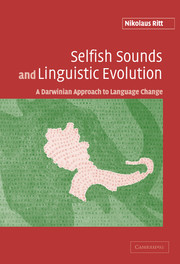Book contents
- Frontmatter
- Contents
- List of figures
- Preface
- 1 Introduction
- 2 The historical perspective
- 3 Approaching ‘language change’
- 4 The Darwinian approach
- 5 Generalising Darwinism
- 6 Towards an evolutionary theory of language
- 7 What does all this imply for the study of language change?
- 8 How to live with feet, if one happens to be a morph-meme
- 9 The prosodic evolution of English word forms or The Great Trochaic Conspiracy
- 10 Conclusion
- References
- Index
9 - The prosodic evolution of English word forms or The Great Trochaic Conspiracy
Published online by Cambridge University Press: 22 September 2009
- Frontmatter
- Contents
- List of figures
- Preface
- 1 Introduction
- 2 The historical perspective
- 3 Approaching ‘language change’
- 4 The Darwinian approach
- 5 Generalising Darwinism
- 6 Towards an evolutionary theory of language
- 7 What does all this imply for the study of language change?
- 8 How to live with feet, if one happens to be a morph-meme
- 9 The prosodic evolution of English word forms or The Great Trochaic Conspiracy
- 10 Conclusion
- References
- Index
Summary
Introduction
It is more or less a commonplace among historical linguists that many of the characteristics of Present Day English have somehow followed from the fact that in Germanic, the progenitor of English, word stress came to be fixed on the first, leftmost, syllable of the root. One of the consequences of this fixing is supposed to have been that word final, that is, the rightmost, syllables first came to be phonetically backgrounded and reduced, and then historically lost. This development has in turn been adduced to explain not only the large number of monosyllables in the core vocabulary of Present Day English, but is additionally supposed to have furthered the loss of inflectional endings and thus the typological change of English from an inflecting towards an isolating language. Therefore, it can be considered indirectly responsible for the fixing of SVO word order as well, because the latter appears to have been necessitated by the very loss of morphological case marking, without which syntactic roles such as subject and object could not be unambiguously indicated anymore.
Although the decisive role which the fixing of Germanic word stress seems to have played in the evolution of English on almost all levels is acknowledged by most linguists, however, the question how exactly it has exerted its influence has not really been addressed.
- Type
- Chapter
- Information
- Selfish Sounds and Linguistic EvolutionA Darwinian Approach to Language Change, pp. 289 - 306Publisher: Cambridge University PressPrint publication year: 2004



